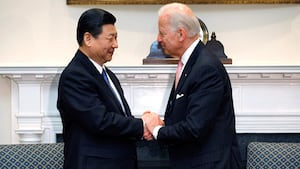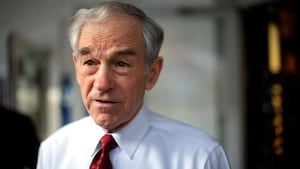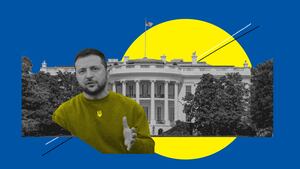Halfway through President Joe Biden’s first term, when assessing his foreign policy performance, the question should not just be “How’s he doing?” It should be “How did he become the most transformative, consequential foreign policy president in at least three decades?”
This isn’t to say Biden has aced every challenge, nor is it a guarantee his administration will adroitly manage the critical international challenges of the next two years. But a sober look at how Biden’s foreign policy has played out since Jan. 20, 2021, reveals a president who has improved the United States’ international standing in almost every metric, after the four-year calamity that was Donald Trump’s term.
George H.W. Bush is considered a great foreign policy president because he helped manage a monumental change in global affairs: the end of the Cold War. He and his team did a remarkable job ensuring that what could have produced chaos instead resulted in the orderly transition from one era to another. But they did not have time to develop or implement sweeping new strategies for the U.S. in this new world—to come up with a post-Cold War playbook. It is a problem that their successors have struggled with for three decades.
The Clinton years saw the post-Cold War world with naïve hope and a focus on free markets that compounded inequality.
The George W. Bush years were shaped by 9/11, and came to stunningly misguided conclusions—from reordering U.S. national security policy to focus on the (grossly overstated) threat of terrorism, to launching a war of choice in Iraq that quickly proved to be a grotesque error, almost certainly the worst in modern U.S. foreign policy history.
Barack Obama offered hope and soaring rhetoric, but a presidency that was far too cautious in taking major steps on the international stage. And Trump was, of course, a disaster, undercutting the U.S.’ international standing, cozying up to enemies, and attacking our allies and alliances.

A group of about 30 Brazilian migrants, who had just crossed the border, sit on the ground near US Border Patrol agents on the US-Mexico border in Sunland Park, New Mexico.
Paul Ratje / AFP via Getty ImagesThen along came Joe Biden. He entered office with more foreign policy experience than any president in U.S. history and a strong international team. But he is Joe Biden. He is not a soaring speaker like Obama. He is not brash in the way that Dubya Bush or Dick Cheney were. He is not the made-for-TV president that Trump was. He is dull, older, kind of gray. It is tempting to say that many of his successes in his first two years have been due to the fact that he is easy to underestimate. (And he was underestimated, most notably by Vladimir Putin.)
But that would be selling him short. Because in two years, half a term, Biden has not only demonstrated the greatest foreign policy mastery of any U.S. president since George H.W. Bush, but has transcended his achievements by being the first president to create a post-Cold War foreign policy that meets the moment—one defined by a recognition of new priorities, threats, opportunities, and challenges.
Still, many questions loom over policy directions taken by the president and his team.
What will be the outcome of the war in Ukraine? Will NATO expansion be continued as planned? Will Europe learn the lessons of the war and wean itself from dependence on Russian energy? Will a positive outcome in Ukraine and parallel diplomacy with Beijing reduce or postpone the risk of confrontation with China over Taiwan?
Will the U.S. help lead the way out of a global economic crisis? Will we learn and implement the lessons of the COVID pandemic? Can we implement global economic policies that are fairer and create more opportunities for average people? Can we rein in new threats from cyber, AI, unmanned weapons systems, disinformation, and the concentration of power around the production of key technologies?
Can we better manage the chaos at our borders? Can we grow and find a new way to lead in a world in which other nations—notably China—but also among our allies, will have and seek greater influence?
But what is striking right now, what is worthy of comment and reflection, is that President Biden and his team have achieved more in two years than many of his predecessors did in eight.
A brief recap and assessment of his progress makes this clear. (Naturally, any “brief recap” is going to be superficial. But I offer it to underscore the scope and import of what has been achieved or is in progress.) Let’s take the major subjects one by one.
Ukraine
A year ago, Ukraine would not have been mentioned in a foreign policy report card like this. Today, it is seen as the defining foreign policy challenge of Biden’s term of office so far.
While the war is far from over, the fact that Ukraine has withstood the Russian onslaught with the active support of a strong global alliance led by the U.S. is nothing less than remarkable—in light of the perceptions that existed just 11 months ago of Russian military superiority.
Biden and his team warned of the onset of the conflict when others dismissed it. They helped mobilize NATO in ways that have directly led to its imminent expansion. They provided massive funding and materiel support to Ukraine. They deftly managed and defused Russian nuclear saber rattling. They released intelligence cannily, stealing the jump on Putin and weakening the perception of him worldwide. (Admittedly, no one is more responsible for Putin’s cratering reputation than Putin himself.) The president has led with resolve and compassion and his team have been masterful on the diplomatic front. New hurdles remain, including the challenge of finding a way to end the conflict while protecting Ukrainian and Western interests. But so far, no doubt about it, Biden gets an A on this front.
Afghanistan
Biden advised Obama to draw down America’s presence in Afghanistan in 2009. His advice was ignored. When Biden came to office in 2021, he was presented with a deal Trump had cut with the Taliban that called for the U.S. to pull out. The Trump terms were terrible, but Biden recognized that prolonging America’s longest war would advance no national interest. He had the courage to do what Bush, Obama, and Trump did not. He actually brought America’s involvement in the war to an end.
The pullout was chaotic. The U.S. misread the speed with which the Taliban would seize the country and that with which the government we had supported would fold. The loss of life associated with a bomb attack on U.S. troops and innocent Afghans was tragic. Many of our allies were left behind.
But behind the scenes, the U.S. also engineered one of the biggest airlifts in history and a global effort to bring the war to a conclusion. Many critics of Biden focus on the two weeks at the very end of the war and miss the bigger picture. A hugely costly 20-year war is finally over.
While Biden gets a C for his management of the pullout (the chaos and misjudgments being offset by the airlift and diplomatic coordination), history will give him an A for ending an endless war.

U.S. Army soldiers walk to their C-17 cargo plane for departure May 11, 2013 at Bagram Air Base, Afghanistan. U.S. soldiers and marines are part of the NATO troop withdrawal from Afghanistan, to be completed by the end of 2014.
Robert Nickelsberg/Getty ImagesRestoring American standing
Trump attacked American alliances, pulled out of international agreements and kowtowed to American enemies. Under Biden, America has strengthened alliances and international institutions. We have once again conducted a values-based foreign policy and led in times of crisis. Poll after poll shows U.S. standing under Biden has rebounded dramatically. Grade: A.
China
Biden has finally overseen the “pivot to Asia” Obama talked about. He has refocused U.S. foreign policy on managing competition with China.
Virtually every major policy statement by the administration—from its National Security Strategy to its National Defense Strategy, from Biden’s first address to Congress to his secretary of state’s opening framing of policy priorities—has had China at the top of the list of U.S. concerns.
From shifting the focus of military planners to elevating diplomacy in the Asia-Pacific region (via the first Quad Summit, AUKUS, a promising economic deal and high level diplomacy), America is finally conducting a foreign policy focused on 21st century issues and the bilateral relationship which will touch virtually every aspect of global affairs in the years ahead.
The mischaracterization of China as a Soviet-like Cold War enemy by a defense establishment eager to justify maintaining high levels of spending on the weapons systems is a mistake and, unfortunately, it’s one to which some Biden advisors have been too sympathetic.
China is a rival. The Taiwan situation is dangerous. But the interdependence of the two countries is great. We need to work together on critical issues, from the global economy to addressing climate change. There are 70,000 U.S. businesses in China.
Fortunately, Biden himself, in his recent meeting with Chinese leader Xi Jinping, showed more balance and deftness than some of his tough talking advisers. Points off for those on the team who overstate the China threat and underplay the need for a more balanced relationship. But generally, good work so far. Grade: B.
The Middle East
The always tumultuous region is playing a more limited role in Biden foreign policy than that of his immediate predecessors. That’s a good thing. But problems remain. A nuclear deal with Iran has been elusive. An olive branch extended to the Saudis was thrown back in Biden’s face. The Israeli government has shifted rightward, and problems in the relationship loom despite Biden’s best efforts to maintain its stability. All of which is a reminder that this is a part of the world in which less is definitely more. Grade: B.
Climate
Biden brought the U.S. back into the Paris Accords and passed the biggest legislative package focused on green investment in U.S. history. He appointed a cabinet level climate czar. He has taken steps to undo the damage Trump sought to do to our national parks. He is committed to shifting America away from fossil fuels. We could and should do more, faster. But overall, his record is better than that of any president in recent history. Grade: A-minus.
Pandemic
Biden helped bring the COVID pandemic under control in the U.S. and importantly ended the ugly Trumpian war against science. His American Rescue Plan helped end the economic crisis associated with the pandemic and, it is now clear, helped America enjoy a softer post-crisis landing than most other major countries. The U.S. also led in efforts to support international programs to contain the disease. That said, while it may seem a remote issue at the moment, we have not taken the steps nor invested the funds necessary to prepare for the next pandemic. We should have learned from COVID that such an attitude is a mistake. Grade: B.
Next Generation threats
Quietly, behind the scenes, the administration has invested in cyberdefense, next generation technologies, sought to stop the flow of dangerous technologies to our rivals, and prioritized understanding the implications of new technologies like AI. (Vice President Kamala Harris gets credit for her leadership role on this issue.) For these efforts, Biden and his team get an A.
Border
The border is a nightmare. Demand to come into the U.S. from people around the world has remained high. America is also dependent on immigrants to fuel our growth… as we always have been. While Biden has not conducted atrocities like Trump’s decision to put children in cages, separate families or his attempt to block the entry of Muslims into the U.S.—solutions for how to manage the flow of undocumented workers into the U.S. elude the administration. Grade: C.
Economics
The international economic policies of the Biden administration are a success story that has not received the attention it has deserved.
Beginning with Treasury Secretary Janet Yellen’s leadership on establishing a global minimum tax for corporations, and extending into important advances in U.S. competitiveness policy (including both the CHIPS and Science Act and the Bipartisan Infrastructure Bill), the administration has focused on making its international policies work for average Americans.
Biden’s administration has also rejected the past reflexive impulses toward free trade deals, and focused more on arrangements that protect workers and the environment. Managing inflation has been a challenge for all countries, but the U.S. has done better than many. Investments in green energy should pay medium and long-term dividends to protect the U.S. from the impact of global fossil fuel markets. Buying gas when it was relatively cheap for the Strategic Petroleum Reserve and releasing it when prices were higher was also a sound move.
And all of this is to say nothing of the recovery from pandemic shocks, record job creation, strong growth and record investment in the U.S. economy. Grade: A.
The overall grade therefore for the Biden foreign policy effort so far, depending on how you weight the above elements, is a B plus or an A minus.
But the president and his team deserve extra credit for doing something none of their predecessors over the past three decades could. They have rejected old (seemingly permanent) thinking and ushered in a foreign policy for a new century. They discarded American triumphalism and focused once again on building alliances (and being a good ally). They even publicly embraced, as in the very first speech of Secretary of State Antony Blinken, a long-overdue and welcome degree of humility into U.S. foreign policy formation.
Crucially, the president and his foreign policy team refused to be distracted by domestic politics. But the greater significance of their efforts will be felt in years to come, as their infusion of creativity, the restoration of sound values, and the courage of our convictions to U.S. foreign policy will produce dividends and a stronger America, better positioned for the challenges of the future. For those important reasons, I give the overall effort to date, despite the great challenges Biden has faced, an A.












